Engineered Hardwood Flooring Pros and Cons
Engineered hardwood continues to gain popularity among U.S. homeowners. Today, it accounts for 30% of wood flooring sold in America. In addition, it’s less costly than solid hardwood and comes in various species and finishes. So, what are the pros and cons of engineered hardwood flooring?
What is Engineered Hardwood?
If you lay an engineered hardwood floor next to a solid wood floor, you’ll have a tough time telling them apart. But here’s the difference.
Engineered hardwood floors feature a wear layer representing a thin veneer of real wood – oak, birch, cherry, hickory, walnut, and more. So, that’s why engineered hardwood easily rivals the look of solid hardwood.
Solid hardwood flooring uses hardwood throughout the plank. However, engineered hardwood floors use a veneer. That veneer gets attached to a plywood core. That core generally uses five to seven layers running in different directions to increase stability for each wood plank.
The more layers, the more stable the flooring. The core material can be plywood, high-density fiberboard, or even hardwood.
If you want to learn more about engineered wood vs. solid wood flooring, click here. By the way, don’t confuse engineered wood with laminate. Laminate flooring doesn’t use natural hardwood as its surface. Instead, it’s a print layer that replicates various wood looks.
The Wear Layer Thickness Impacts Performance
The thickness of the veneer plays an essential role in engineered wood’s performance.
For example, engineered hardwood floors with a 1mm wear layer typically last 20 to 30 years. Increase that layer to 2mm, and you can extend the floor’s life to 30 to 40 years. Bump it up to 4mm, and you’ll enjoy a lifespan of well beyond 50 years, even up to 100.
The reason is that by increasing the wear layer’s thickness, you can refinish your wood floors more often. For example, a thin, 1mm veneer can only withstand recoating. But a 4mm wear layer can handle three to four refinishes before reaching the core layer.
What’s Great About Engineered Hardwood Flooring?
Now that you understand a bit more about engineered hardwood construction let’s look at how that translates to the pros of installing engineered hardwood floors in your home.
Engineered Hardwood Costs Less Than Solid Hardwood
Less solid hardwood means lower costs for wood flooring of the same species. Solid hardwood flooring ranges from $4 to $12 per square foot. On the other hand, engineered hardwood falls between $2.50 to $10 a square foot, with most floors in the $4 to $7 neighborhood.
So, if budget is a concern and you want oak flooring, oak engineered hardwood lets you accomplish that at a better price than solid oak hardwood.
The reduced costs especially come into play with exotic woods like mahogany, teak, and Brazilian walnut.
Fewer Concerns About Moisture on Your Hardwood Floors
Here’s a significant pro associated with engineered hardwood floors – they’re temperature and water resistant, thanks to those composite layers. And that’s great news if you live somewhere where your wood floors encounter humid conditions.
Moisture, humidity, and heat can cause wood floors to expand and contract. That translates to warping and cupping if you’re not careful.
Engineered hardwood floors are much less sensitive to the effects of temperature and water. As a result, the overall amount of shrinking and swelling is less than you’d encounter with solid hardwood floors.
Because they feature improved water resistance and dimensional stability, engineered hardwood floors can be installed almost anywhere. In contrast, solid wood flooring has some limitations, primarily where moisture concerns exist. So engineered lets you enjoy wood flooring in your basement, mudroom, kitchen, and even bathroom.
Don’t Confuse Water-Resistant with Waterproof
Engineered hardwood floors have water resistance. However, they are not waterproof. And there’s a big difference between the two.
For example, water-resistant wood flooring withstands spills with the notion you deal with those spills quickly. Otherwise, water will eventually penetrate the wood floor. On the other hand, waterproof flooring stops water from penetrating.
Today, some manufacturers like Hartco offer waterproof wood flooring. Its HydroBlok™ engineered hardwood floors use a three-part system that guarantees top-down moisture protection for up to 36 hours.
Plus, HydroBlok features scratch and dent resistance, with a Janka rating of up to 2500 (that means is takes 2500 lbs of force to embed a .444″ diameter steel ball into the wood to half the ball’s diameter). That’s nearly double the rating of white oak at 1,360.
Engineered Hardwood is Easier to Install and DIY-Friendly
To start, engineered hardwood planks come prefinished. There’s no sanding, staining, or sealing. You can move in immediately following the installation of your hardwood flooring.
In addition, engineered wood requires less time to acclimate than solid wood flooring. Acclimation happens in a few days versus the five-day minimum for solid hardwood. As a result, you can get to work sooner and finish the job faster.
Plus, engineered hardwood installation is more straightforward than that of solid hardwood flooring. You can install engineered hardwood flooring in various ways, including nailing, stapling, gluing, or even floating your floor.
Sustainable Wood Flooring
Because engineered hardwood flooring uses a thin hardwood veneer, your wood flooring requires less hardwood per plank than solid wood floors. As a result, flooring manufacturers don’t need to cut as many trees.
Besides sustainability, engineered hardwood is more eco-friendly than other flooring products like linoleum or carpet. For example, manufacturers don’t require harmful chemicals in the creation process.
Plus, engineered hardwood flooring produces little waste. Byproducts from the manufacturing process like wood chips and sawdust contribute to creating composite products like paper.
Finally, wood flooring contributes to better air quality as it has no chemical emissions. Moreover, wood floors are hypoallergenic. Unlike carpeting, they don’t trap pollen, pet dander, or other allergens.
Engineered Hardwood Flooring Lasts a Very Long Time
High-quality engineered hardwood floors last and last. For instance, Hartco warrants its wood flooring for 50 years.
That’s another way engineered hardwood supports the environment. Also, because your floors last so long, they don’t have to be replaced nearly as often as other flooring products. So, that generates less waste in landfills.
It also means you won’t be spending money to replace your floors. Instead, engineered hardwood flooring represents an investment. One that also improves the resale value of your home.
What are the Cons of Engineered Hardwood?
Poor manufacturing creates many issues with engineered hardwood flooring. Some manufacturers use cheap materials that produce wood floors. And that can lead to flooring with poor structural integrity. For example, a manufacturer might use an oriented strand board (OBS) that compromises the floor’s stability.
So, you need to pay close attention to your product.
* How thick is the veneer?
* How many layers comprise the core?
* How thick are the floor’s planks?
* How long is the warranty?
Thin Wear Layers Reduce Your Floor’s Lifespan
As mentioned, the thinner the wear layer, the less opportunity you have to refinish your engineered hardwood. For example, using a 1mm veneer, engineered hardwood won’t allow you to sand and refinish your wood flooring.
It’s best to purchase engineered hardwood with a 3mm or more wear layer. That thickness leaves the door open for you to potentially sand and refinish your flooring at least twice. But even then, there’s a limit to how often you can refinish the wood’s surface.
Engineered Hardwood Can Suffer Water Damage
Even some of the best engineered hardwood floors can’t resist standing water. So, if you have moisture concerns, you might want to consider another waterproof option like rigid core vinyl plank flooring or other types of flooring.
If you want to stick with hardwood flooring, consider a waterproof hardwood option like the aforementioned HydroBlok wood floors from Hartco.
Engineered Hardwood Floors Require Maintenance
Fading, scratches, and dents happen. And that means you must maintain your engineered hardwood floors to keep them in tip-top shape. At some point, it might even mean refinishing them if scratches become an annoyance.
If you have pets or active children, your floors will be more prone to damage. You can combat that by selecting a wear layer with a higher Janka rating. Oak, hickory, and maple have notoriously high Janka ratings.
You can also look at an engineered hardwood like HydroBlok, built to withstand stains, scratches, and high traffic.
When cleaning your hardwood floors, it’s best to avoid wet mopping. Again, too much water on the floor can lead to warping and cupping. So, use cleaners designed for wood floors and without harsh chemicals.
The Wood Can Fade
When exposed to sunlight and UV rays, engineered wood floors, like solid wood floors, can fade. And that fading can be uneven with furniture or rugs.
So, if you use engineered hardwood floors, it’s best to keep blinds and drapes closed. Or you can place rugs where the wood encounters UV rays.
Are Engineered Hardwood Floors Right for You?
So, there you have it — engineered hardwood pros and cons.
There’s a lot to like about engineered hardwood. It costs less than solid wood flooring and is easier to install, perfect for a DIY enthusiast. Plus, you can install it in locations where a solid hardwood floor could encounter moisture issues.
Just like everything, engineered wood floors have their concerns: fading, potential water damage from excess water, and limited refinishing. In addition, engineered hardwood may not be a good choice when looking for a low-maintenance floor.
But if you love wood floors but are looking for more flexibility than solid hardwood floors, engineered hardwood is a perfect choice.
Hartco offers more than 200 engineered hardwood flooring options. In addition, you can select from seven hardwood species in various finishes, including distressed wood, hand scraped wood, and wire brushed wood.
Find your local Hartco retailer. And make sure you check out our floor visualizer. It eliminates the guesswork of buying solid hardwood and engineered hardwood flooring. Just take a picture of your room and let our visualizer do the rest
Inspiration to Your Inbox
Sign up for news about our latest flooring innovations—and get inspired for your next project.
Sign Up
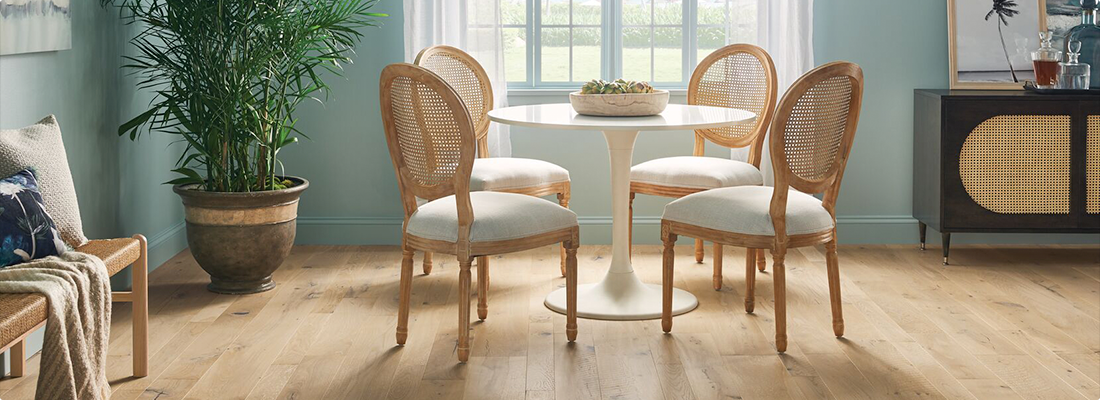
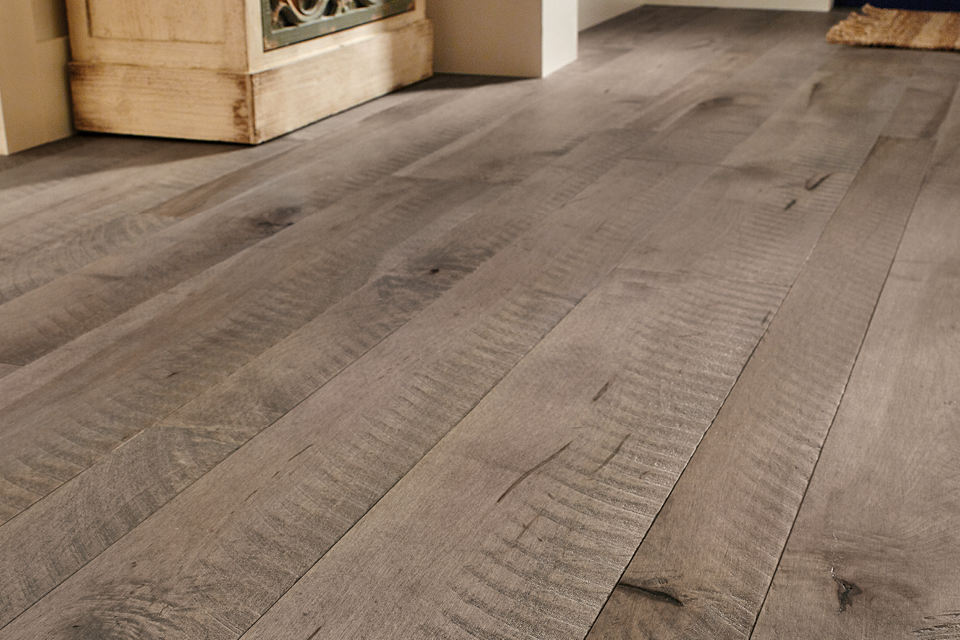 Engineered Hardwood vs. Laminate
Engineered Hardwood vs. Laminate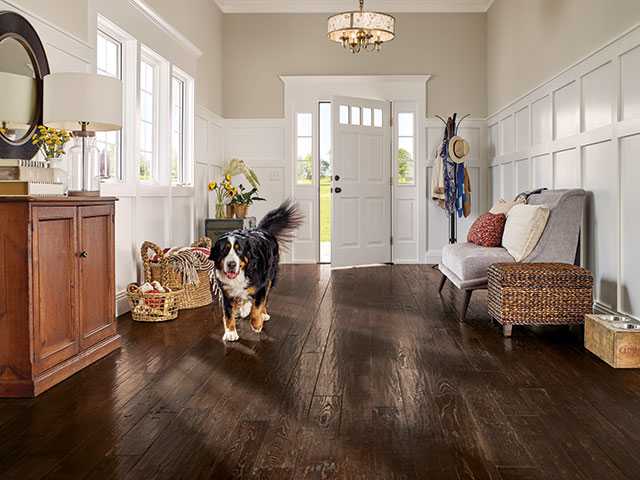 How to Clean Hardwood Floors
How to Clean Hardwood Floors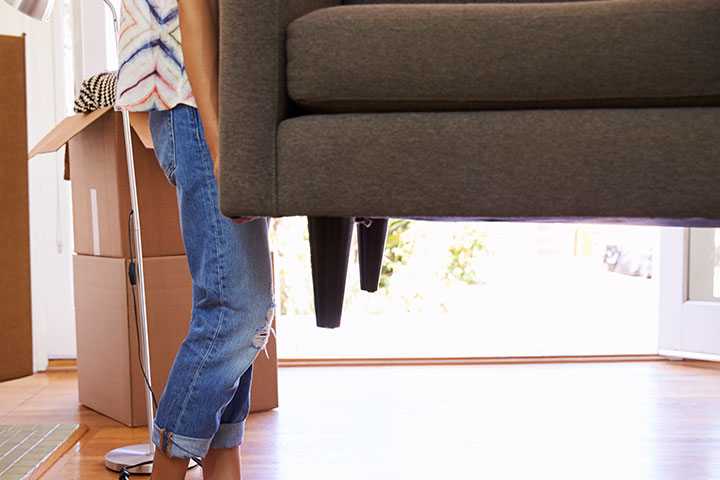 Hardwood Flooring Installation
Hardwood Flooring Installation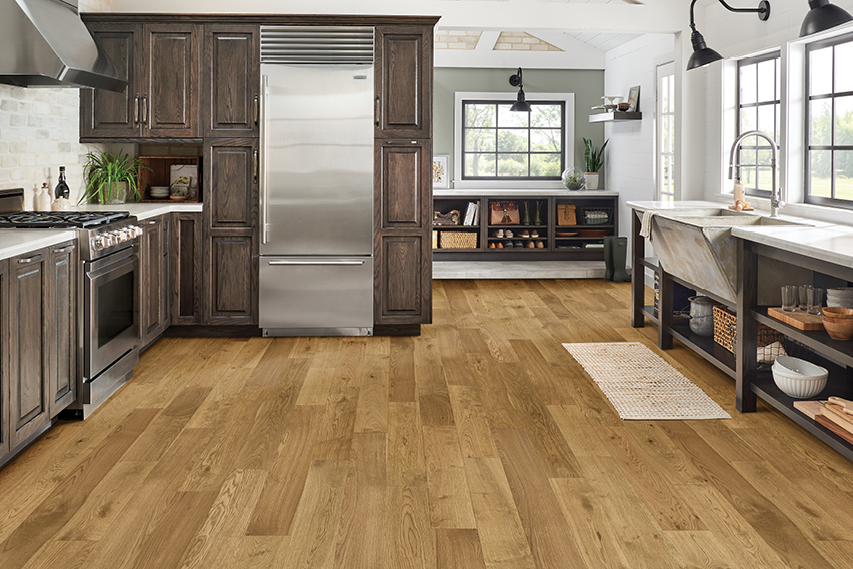 How Much Does Hardwood Flooring Cost?
How Much Does Hardwood Flooring Cost?